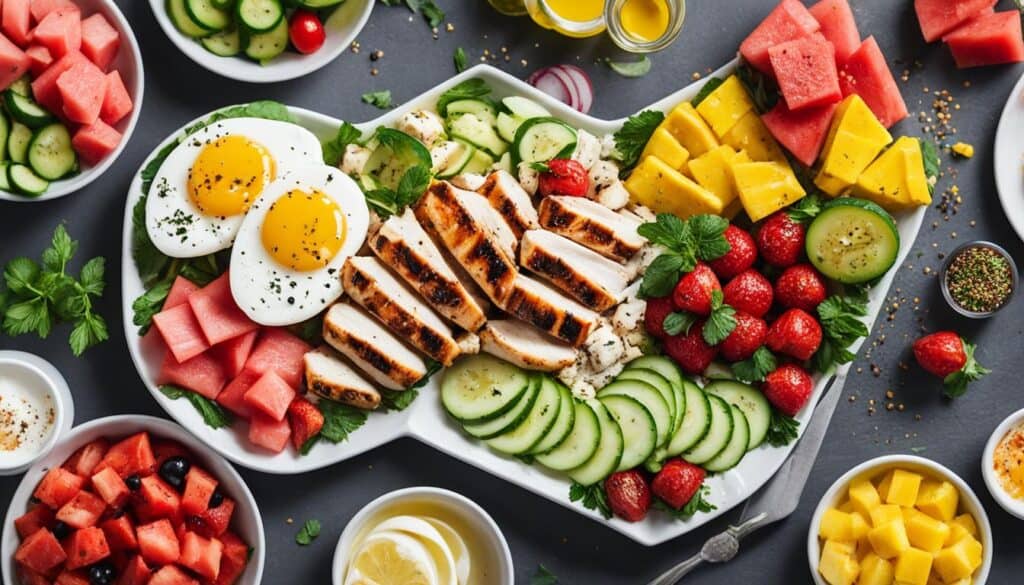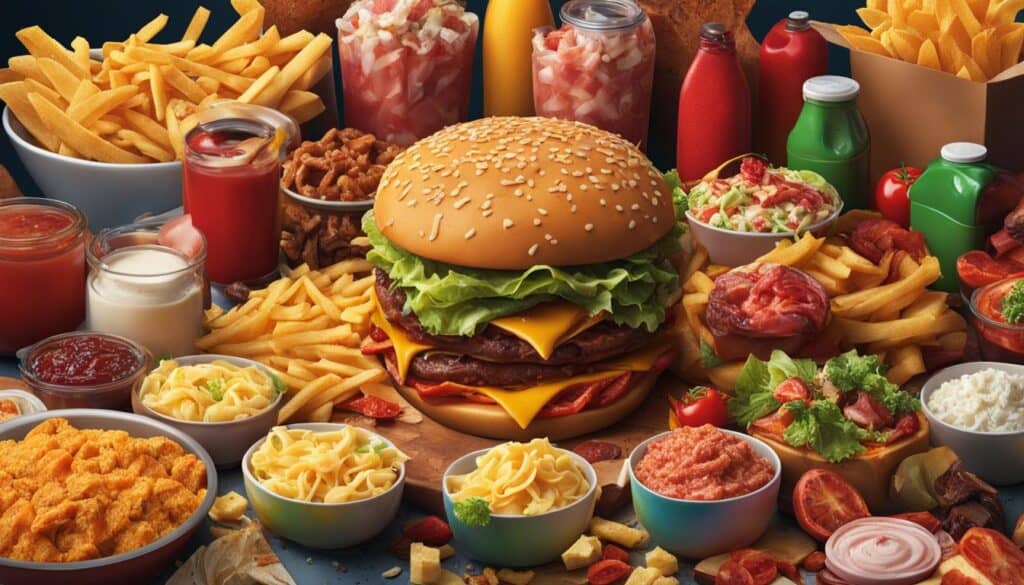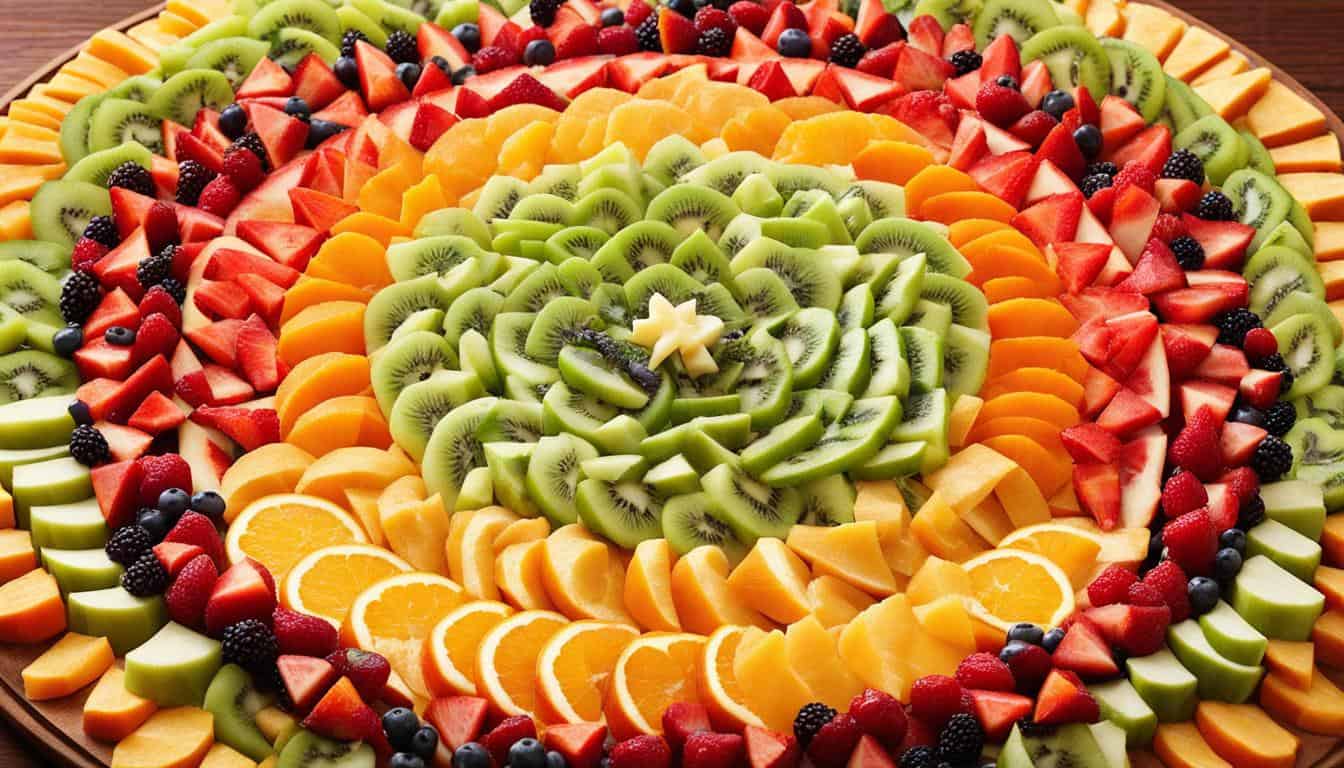I’m here to provide you with a digestion guide that focuses on the ease of digesting fruits. If you’ve ever wondered whether fruits are easy to digest or if they can benefit your digestive system, this article is for you!
Fruits are an essential part of a healthy diet, packed with essential nutrients and vitamins. However, some individuals may experience digestive issues after consuming certain types of fruits. So, let’s explore which fruits are considered easy to digest and how they can promote healthy digestion.
Key Takeaways:
- Certain fruits are easier to digest, especially those that are low in fiber.
- Very ripe bananas, cantaloupe, honeydew melon, watermelon, and avocado are examples of fruits that are easy to digest.
- Cooking fruits, peeling the skin, and removing the seeds can further aid in digestion.
- Consuming these easy-to-digest fruits in moderation can help alleviate digestive issues such as gas and bloating.
- Listening to your body and paying attention to how different fruits make you feel is essential in determining what works best for your individual digestion.
What Foods are Easiest to Digest?
When it comes to choosing foods that are easy to digest, opting for low fiber options is key. High-fiber foods can often lead to uncomfortable symptoms such as gas, bloating, and difficulties with bowel movements. To promote better digestion, consider incorporating the following foods into your diet:
Canned or cooked fruits without skin or seeds
When fruits are cooked or canned without their skin or seeds, they become easier to digest. This is because the fiber content is reduced, making them gentler on the digestive system. Some examples of these easily digestible fruits include:
- Applesauce without skin or seeds
- Canned peaches or pears without skin or seeds
Canned or cooked vegetables
Similar to fruits, vegetables that are cooked or canned are also easier to digest. These preparations help break down the fiber, making them more gentle on the stomach. Some examples of these cooked or canned vegetables include:
- Cooked carrots
- Canned green beans
- Cooked spinach
Lean proteins like chicken and fish
Lean proteins are generally easier to digest compared to higher-fat options. Chicken and fish, for instance, are great choices that are low in fat and tend to be easier on the digestive system. If you’re a vegetarian, other easily digestible protein sources include eggs, creamy nut butters, and tofu.
Refined grains
Refined grains have had the bran and germ removed, resulting in a lower fiber content. This makes them easier to digest compared to whole grains. Consider including the following refined grains in your diet:
- White bread
- White rice
- Plain bagels
To further enhance digestion, it’s important to cook meats in a way that promotes easy digestion. Avoid frying and instead opt for grilling, broiling, baking, or poaching methods.
By incorporating these foods into your diet, you can support a healthy digestive system and reduce discomfort associated with digestion-related issues.
Easy-to-Digest Fruits
When it comes to easy digestion, choosing the right fruits can make a big difference. Certain fruits have a softer texture and lower fiber content, making them easier on the digestive system. Here are some easy-to-digest fruits that you can incorporate into your diet:
- Very ripe bananas: These bananas are not only sweeter but also have a lower fiber content, making them easier to digest. Enjoy them alone or add them to smoothies or oatmeal.
- Cooked or canned cantaloupes: Cantaloupes and other melons like honeydew and watermelon can be easier to digest when cooked or canned. The cooking process helps break down the fiber, making it gentler on the stomach.
- Avocado: With its creamy texture and healthy fats, avocado is a great choice for easy digestion. It can be eaten on its own or added to salads and sandwiches.
- Applesauce without skin or seeds: Opt for smooth applesauce without the skin or seeds, as they can be harder to digest. Applesauce is not only easy on the stomach but also provides essential nutrients and hydration.
It’s important to consume these easy-to-digest fruits in moderation to avoid triggering any abdominal discomfort. Incorporating a variety of these fruit options into your diet can provide you with both taste and digestive benefits.
Remember, it’s always a good idea to consult with a healthcare professional or nutritionist before making any significant changes to your diet.
| Fruit | Texture | Fiber Content |
|---|---|---|
| Very ripe bananas | Soft | Low |
| Cooked or canned cantaloupes | Soft | Low |
| Avocado | Creamy | Low |
| Applesauce without skin or seeds | Smooth | Low |
Cooked Vegetables for Easy Digestion
When it comes to easy digestion, cooked vegetables can be a game changer. Just like fruits, vegetables become easier to digest when they are cooked. This is because the cooking process helps break down the fiber and make them more gentle on the digestive system. If you’re looking to incorporate more cooked vegetables into your diet, here are some options that are low in fiber and great for easy digestion:
| Vegetable | Digestion-friendly highlights |
|---|---|
| Yellow squash without seeds | Soft texture and low fiber content |
| Spinach | Mild flavor and low fiber content |
| Pumpkin | Smooth texture and low fiber content |
| Beets | Slightly sweet taste and low fiber content |
| Green beans | Tender texture and low fiber content |
| Carrots | Crunchy texture when cooked and low fiber content |
On the other hand, it’s important to avoid raw vegetables and those with high fiber content when you’re aiming for easy digestion. Raw vegetables can be tough on the digestive system and may cause discomfort. Here are some high-fiber vegetables to steer clear of:
- Corn
- Mushrooms
- Onions
- Cabbage
For a more easily digestible option, you can also try vegetable juices without pulp. These juices are typically low in fiber and can provide the nutrients your body needs without putting additional strain on your digestive system.

By incorporating cooked vegetables into your meals, you can help promote better digestion and minimize any discomfort. Experiment with different cooking methods and preparations to find what works best for you. Remember, everyone’s digestive system is unique, so it’s important to listen to your body and make choices that support your individual needs.
Lean Proteins for Easy Digestion
When it comes to easy digestion, incorporating lean proteins into your diet can be a smart choice. Lean proteins are not only delicious but also offer numerous benefits for your digestive system. Whether you’re a meat lover or a vegetarian, there are plenty of options to choose from to ensure that your protein intake supports your digestion.
Main Courses of Lean Protein
When it comes to main courses, lean proteins like chicken, turkey, and fish are your best bet for easy digestion. These protein sources are low in fat and tend to be easier for the body to break down and absorb. Additionally, tender cuts of beef or pork and ground meats can also be good options when prepared properly.
Vegetarian Sources of Protein
If you follow a vegetarian diet, there are still plenty of ways to incorporate easy-to-digest proteins into your meals. Eggs are an excellent source of protein and can be prepared in a variety of ways. Creamy nut butters, such as almond or peanut butter, are another tasty option. For those who enjoy plant-based protein, tofu is a popular choice. It can be marinated and cooked in different ways to suit your taste preferences.
Here is a summary of lean proteins for easy digestion:
| Lean Proteins | Description |
|---|---|
| Chicken | A lean meat option that is high in protein and low in fat. It can be prepared in various ways, such as grilling or baking. |
| Turkey | Similar to chicken, turkey is a lean protein choice that is often associated with holiday meals. It can be roasted or incorporated into dishes like turkey burgers. |
| Fish | Rich in omega-3 fatty acids, fish such as salmon, trout, and tuna provide both protein and heart-healthy fats. They can be grilled, baked, or broiled. |
| Eggs | A versatile protein source that can be scrambled, boiled, or made into omelets. Eggs are easy to digest and can be enjoyed any time of the day. |
| Creamy Nut Butters | Almond butter, peanut butter, and other nut butters offer protein and healthy fats. Spread them on whole wheat toast or use them as a dip for fruits and vegetables. |
| Tofu | A popular plant-based protein source, tofu can be marinated and cooked in a variety of ways. It is easy to digest and can be a versatile addition to stir-fries, salads, or soups. |
Remember, it’s important to prepare meats using healthy cooking methods like grilling, broiling, baking, or poaching. Avoid frying as it can make proteins harder to digest. By incorporating lean proteins into your diet, you can support your digestion while enjoying the benefits of a well-rounded and nutritious meal.

Refined Grains for Easy Digestion
When it comes to promoting easy digestion, whole grains are often recommended for their fiber content. However, there are instances where refined grains can be a better choice. Refined grains have had the bran and germ removed, making them easier to digest compared to their whole grain counterparts.
If you’re looking for easy-to-digest grains, consider incorporating these refined grain options into your diet:
- White or refined breads
- Plain bagels
- White toast
- White crackers
- Low-fiber cereals
- Pretzels made with refined flours
These refined grain products provide a smoother texture and are gentler on the digestive system. However, it’s important to note that refined flours should still be consumed in moderation as part of a balanced diet.

Dairy Products and Digestion
When it comes to digestion, dairy products can play a significant role. They are generally low in fiber and can be easy to digest for many individuals. However, it’s essential to consider lactose intolerance, as it can lead to digestive issues for some people.
If you’re lactose intolerant, there are several alternatives that you can choose from, such as lactose-free milk, cheese, and yogurt. These options provide the benefits of dairy products without the potential discomfort caused by lactose. It’s important to read labels carefully and look for products specifically labeled as lactose-free or low in lactose. This ensures that you’re selecting dairy options that will be easier on your digestive system.
Additionally, it’s best to avoid high-fat dairy foods like ice cream if you’re looking for easy-to-digest options. These foods can be heavier on the stomach and potentially cause digestive discomfort. Instead, opt for plain milk or dairy products without added fruit, seeds, nuts, or artificial sweeteners. This helps to reduce the amount of potential irritants to your digestive system and promotes easier digestion.

Remember to listen to your body and pay attention to how different dairy products make you feel. If you notice any discomfort or digestive issues, it may be beneficial to consult with a healthcare professional. They can provide personalized guidance and help you create an individualized eating plan that supports better digestion.
Foods to Avoid for Easy Digestion
When it comes to maintaining a healthy digestive system, it’s essential to be mindful of the foods we consume. While some foods support easy digestion, there are certain foods that can be harder on the digestive system and should be avoided.
“Your diet plays a crucial role in your digestive health. Avoiding certain foods can help prevent digestive problems and promote overall well-being.”
1. High-Fiber Fruits
Fruits are generally beneficial for our health, but when it comes to easy digestion, some high-fiber fruits may cause discomfort. It’s best to avoid dried fruits, such as raisins and dates, as well as fiber-rich fruits like pineapple, coconut, and berries. These fruits can be harder for the digestive system to break down, potentially leading to bloating and gas.
2. Raw Vegetables with High Fiber Content
Raw vegetables are undeniably nutritious, but they can be difficult to digest, especially those with high fiber content. To promote easier digestion, it’s recommended to avoid raw corn, mushrooms, onions, and cabbage. Cooking these vegetables can help break down the fiber and make them more easily digestible.
3. Fermented Foods
Fermented foods, although known for their probiotic benefits, can cause digestive issues for some individuals. Foods like sauerkraut, kimchi, and certain pickled vegetables may lead to bloating and discomfort. If you have digestive problems, it might be best to limit or avoid these foods.
4. Tough Meats
While protein is an important part of a balanced diet, certain types of meat can be harder to digest. Tough cuts of meat or meats that have been slow-cooked for a long time may require more effort for the digestive system to break down. Opting for leaner and tender cuts of meat can help promote easier digestion.
5. Whole Nuts and Whole-Grain Products
Although nuts and whole grains are healthy choices in moderation, they can worsen digestive problems for some people. Whole nuts can be difficult to digest due to their high fat and fiber content. Similarly, whole-grain products like whole-wheat bread and brown rice may cause bloating and gas in individuals with sensitive digestion. Choosing refined versions of these foods can be easier on the digestive system.
6. Dairy Products with Added Fruit, Nuts, or Artificial Sweeteners
Dairy products can be a source of digestive trouble for some individuals, especially when combined with certain ingredients. Dairy products like yogurt or milk with added fruits, nuts, or artificial sweeteners may lead to discomfort and bloating. Opting for plain, low-lactose, or lactose-free options can help prevent digestive issues.
By being mindful of these foods to avoid, you can help support a healthy and comfortable digestive system. Remember, everyone’s digestion is unique, so it’s essential to listen to your body and make choices that work best for you.

Conclusion
When it comes to maintaining a healthy digestion, choosing an easy-to-digest diet is key. Opting for foods that are low in fiber and gentle on the digestive system can help prevent discomfort and digestive issues.
Cooked fruits and vegetables, such as ripe bananas, cantaloupes, and spinach, offer the benefit of being easier to digest. Lean proteins like chicken, fish, and tofu provide essential nutrients without putting too much strain on the digestive system.
Refined grains, such as white bread and low-fiber cereals, are good alternatives to whole grains for those seeking easier digestion. Similarly, low-lactose dairy products like lactose-free milk and plain yogurt can be enjoyed without causing digestive problems.
However, it’s important to be mindful of high-fiber foods, fermented items, tough meats, and certain fruits and vegetables that can potentially disrupt digestion. Pay attention to how different foods make you feel and consult with a healthcare professional for personalized guidance on creating an individualized eating plan for better digestion.
FAQ
Is fruit easy to digest?
Certain types of fruits are lower in fiber and may be easier to digest, making them beneficial for relieving digestive issues such as gas or bloating.
What foods are easiest to digest?
Foods that are easy to digest tend to be low in fiber. This includes cooked fruits and vegetables, lean proteins, refined grains, and low-lactose dairy products.
What are some easy-to-digest fruits?
Some easy-to-digest fruits include very ripe bananas, cantaloupe, honeydew melon, watermelon, and avocado. Cooking fruits, peeling the skin, and removing the seeds can also make them easier to digest.
Are there cooked vegetables that are easy to digest?
Yes, cooked vegetables such as yellow squash without seeds, spinach, pumpkin, beets, green beans, and carrots are good options for easy digestion. Avoid raw vegetables and those with high fiber content.
What are some lean proteins that are easy to digest?
Main courses of lean protein like chicken, turkey, fish, tender cuts of beef or pork, and ground meats are generally easier to digest. Vegetarians can try eggs, creamy nut butters, or tofu for added protein.
Which grains are easier to digest?
Refined grains such as white bread, plain bagels, white toast, white crackers, low-fiber cereals, and pretzels made with refined flours are easier to digest compared to whole grains.
Can dairy products be easy to digest?
Dairy products can be low in fiber and easy to digest for many people. However, those who are lactose intolerant may experience digestive issues. Look for lactose-free or low-lactose options.
Are there any foods to avoid for easy digestion?
It is best to avoid high-fiber fruits like dried fruits, pineapple, coconut, and berries. Raw vegetables, tough meats, whole nuts, whole-grain products, and dairy products with added fruit, nuts, or artificial sweeteners may also cause digestive issues.
What is a recommended easy-to-digest diet?
When considering digestion, it’s important to choose foods that are low in fiber and easy to digest. Cooked fruits and vegetables, lean proteins, refined grains, and low-lactose dairy products are generally easier on the digestive system. Avoid high-fiber foods and foods that may cause digestive problems. Consult with a healthcare professional for an individualized eating plan.





Leave a Reply